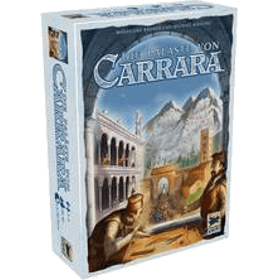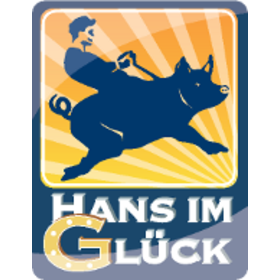carrara
 carrara is a game designed by Michael Kiesling,Wolfgang Kramer and published by Hans im Glück.
carrara is a game designed by Michael Kiesling,Wolfgang Kramer and published by Hans im Glück.
LB_NUMBER_OF_PLAYERS: 2 - 4
Game duration: 35 mn
Complexity: 2 / 5
Play carrara and 1229 other games online.
No download, directly from your web browser.
With your friends and thousands of players from the whole world.
Free.

Play carrara and 1229 other games online.
No download, directly from your web browser.
With your friends and thousands of players from the whole world.
Free.

Rules summary
Link to english rules:
https://dl.dropboxusercontent.com/u/720402/Palaces%20of%20Carrara.pdf
The above wasn't working for me so I found a compressed version at
https://boardgamegeek.com/file/download/on2gtesdac/Palaces_of_Carrara_Rules_Summary_v1.1.pdf
and also full looking version
Components
There are a total of 42 blocks, 7 of each of 6 colours: white, yellow, red, green, blue, and black.
There are a total of 30 buildings, in 6 different types, with block costs of 1, 2, 3, 4, and 5. For expansion games, there are an additional 6 buildings, with block costs of 8. They are separated into land (green-coloured) and city (gold-coloured):
- villa (land): produces coat of arms objects
- castle (land): produces flag objects
- cathedral (city): produces cup objects
- porta (city): produces gate objects
- library (city): produces book objects
- palaces (city): produces crown objects
5 of each of these types of objects can be acquired via scoring of cities. 1 of each type can ONLY be purchased for 10 coins from the board after a player's turn action.
There are 6 cities on the board where buildings can be built. The buildings can only be built with a sufficient number of blocks that each city will accept.
- Livornoa: only white blocks
- Pisa: white or yellow blocks
- Lucca: white, yellow, or red blocks
- Viareggio: white, yellow, red, or green blocks
- Massa: white, yellow, red, green, or blue blocks
- Lerici: white, yellow, red, green, blue, or black blocks
Standard vs. Expansion
The 'standard' game should be considered as a learning setup only since the game becomes one of block buying efficiency. Here are the limitations in the standard game:
- turning the block buying wheel is MANDATORY;
- there is no separate scoring spot for land or city buildings;
- 8.block buildings and their bonus scoring tiles are not available;
- you can not upgrade existing buildings; AND
- 3 fixed objectives.
Objectives
In an expansion game, there are 4 objective categories. There are 6 brown 'top' objectives, 8 purple 'object' objectives, 9 gray 'building' objectives, and 8 green 'bonus vps' objectives. In order for a player to declare the end of the game, they must meet the minimum requirements of the first 3 objectives. The fourth objective is only scored for bonus points at the end of the game. Some objectives are scaled for the number of players. Because of the number of objectives, and how they interact with each other, each game can require very different strategies, leading to excellent game replayability.
Playing the Game
Each turn, a player can do 1 of 3 things:
- buy blocks;
- build a building; OR
- score a city or building type.
'Buying Blocks'
At the start of each game, there is 1 block of each colour in the first segment of the block wheel, with costs for each colour indicated on the outer rim. A player choosing to buy blocks may choose to turn the wheel one segment to decrease the cost before buying (this turn action is MANDATORY in the standard game). As the wheel is spun, each block becomes progressively cheaper by 1 coin, so that by the final segment, white blocks cost 1 coin, and every other block colour can be purchased for free. After the wheel is spun, a number of blocks are supplied to the first segment until the total number of blocks on the wheel is 11. If the wheel is NOT spun, no new blocks are supplied.
Each player starts with 20 coins. After choosing to spin the wheel (or not), the active player can buy as many blocks from a single segment as they wish, as long as they have sufficient coins. Remember, spinning the wheel gives you access to cheaper blocks, but your opponents can also spin on their turns so any blocks you do not buy will get cheaper for them. If there are any blocks remaining in the final (cheapest) segment when the wheel is spun, they remain on the wheel and spin back into the 'first' segment.
If, after spinning the wheel, a player does not have enough coins to buy ANY available block, they get 2 coins from the bank which ends their turn. If the wheel is empty and there are no blocks remaining in the supply, players must either build or score instead.
'Building Buildings'
Randomly selected, 9 of the 30 basic buildings are placed on the main board. For expansion games, the 6 8.block buildings are also made available beside the board. To build an available building, you first select the one you want, then click above the city (on your own player board) where you wish to build it. You then choose which blocks you wish to use to build the building, keeping in mind the block colour restrictions for each city. Blocks used to build in this way are returned to the supply. Another building from the supply (if available), is placed in the empty space on the main board.
In expansion games, when you build an 8.block building, you can choose ANY 1 of the 8 bonus scoring tiles, regardless of the city that you built in or the building type. The ones for the cities of Livornoa, Pisa, and Lucca add +1 vp and +1 coin to the base scoring for each of those cities. The ones for the cities of Viareggio, Massa, and Lerici all add +1 vp to the base scoring for each of those cities. The ones for land and city buildings double the vps or coins received when using those scoring spaces.
Also only in expansion games, you can upgrade an existing building in a city by paying the difference in block costs between the existing building and the more expensive new building (of any type) that you wish to put in its place. So, to upgrade a 1.block building to a 3.block building, you need to spend 2 blocks, keeping in mind the block colour restriction for the city.
'Scoring'
Each player starts with 6 scoring meeples. If you have used all 6 of your scoring meeples, you can no longer take the scoring action.
To score a city, you must have sufficient buildings built in that city. For the cities of Livornoa, Pisa, and Lucca, only 2 buildings are required before those cities can be scored. For the cities of Viareggio, Massa, and Lerici, 3 buildings must be built before they can be scored. You can build more buildings in a city than the minimum before scoring that city, but each city can only be scored ONCE during the game. So, after one player scores a city, they place one of their scoring meeples on that city on the main board, and every other player is blocked from scoring that city.
When a city is scored, each building in the city generates an object as long as there are objects of that type in the pool (excludes the 6 objects on the main board, which can only be purchased). As well, each scored city provides a separate bonus, either vps or coins (or both for expansion games after building an 8.block building), with the base score of the city multiplied by the number of blocks used to build the buildings in that city.
- So, if you had the 1.block palace, 2.block castle, and 3.block library when you scored viareggio, you would collect 1 crown object, 1 flag object, and 1 book object, along with 1+2+3 (building blocks) * 2 (coins per block basic viareggio bonus) = 12 coins from the bank.
Instead of scoring a city, you can choose to score one of the 6 building types, as long as you have built at least 1 of the buildings matching that type. Each building will provide the city score bonus that they are in (including block building multipliers), plus generate an object (if available). Place a scoring meeple on your board to match the type that you are scoring. Opponents can NOT block you from scoring your own building types in this fashion, but once you have scored a type, you can not score that again.
For expansion games, you can also score city buildings for coins (with building block multiplier) or land buildings for vps (with building block multiplier).
Also for expansion games, after an 8.block building is built, a bonus tile can be placed on the player board. Every subsequent scoring will take into account the extra bonuses for that city or type.
'Buying Objects'
After each player's action, they have the option to puchase one of the 6 available objects on the main board (1 of each type) for 10 coins. If there are no remaining objects on the board, then no objects may be purchased.
Ending the Game
A player can CHOOSE to declare the game end if they successfully meet or exceed the requirements for the first 3 objectives. If they do so, they collect 5 vp for the declaration. Each other player who has not yet played that turn (look to who has the first player marker) will get a final turn to act.
If no one can or wants to declare the game end, the game ends when all 30 of the buildings on the main board have been built. Each other player who has not yet played that turn (look to who has the first player marker) will get a final turn to act.
Final Scoring
Any object not included in the purple 'Object' objective is worth 1 vp (expansion games only).
Coins are worth 1 vp for every 5 coins (unless you have the 'Top' brown objective that gives a different value).
Each player will get vps for any objective cards that they match.
Tiebreaker: The player with the most remaining purchased blocks, regardless of colour.

